Barbara Rainey's Blog, page 8
March 27, 2023
Anticipating Easter: Waiting With Eagerness


Laura is my youngest child, and from the time she was four or five she woke up before dawn on Christmas day. Her excitement and anticipation made it difficult to sleep.
As she got older, this sleepless pattern extended to include the nights before tryouts or before big events like the high school prom or a trip with her dad. When she got married at age 31, so great was her anticipation that I was afraid she wouldn’t sleep even five minutes on her wedding eve! But she did … a little anyway. Her bridesmaids spent the night with her here at our house, so I’m not sure it was quiet until the wee hours.
Laura is an “all in” girl who lives the moments of life to the fullest. Her sense of anticipation blooms full as she nears something she’s really excited about. And I’m so glad she’s never outgrown her childhood enthusiasm.
Her joie de vivre is infectious. Laura has taught me to be more expressive, to more fully engage in all of life. As a result I’ve learned there is a great difference between just waiting around and waiting with great hope.
Anticipation is watching with hope and expectancy; it is indispensable to our faith. While we easily associate this sense of expectation with Christmas, I’ve never heard anyone link it with Easter. And yet because we know the end of the story—that Christ rose from the grave—we of all people should anticipate this day of celebration for our faith.
Easter is the holy day that ushers in our hope of being united with Jesus at the marriage supper of the Lamb. Just as Laura and most other brides eagerly, expectantly, and joyfully anticipate their wedding day, so we as believers should experience the same expectancy about Easter. It is our engagement, the promise of His coming back for us to be His bride!
Jesus told us to become as little children (Matthew 18:3). One way to cultivate a more trusting child-like faith is to practice anticipation. Here are three ways:
Ask God to clear away the fog of our “We know the story” mindsetso we can see afresh the stunning wonder of the Resurrection. Invite the Holy Spirit to open your eyes,to see with wonder and awe the miracles of Easter for you, that Jesus died for you as if you were the only one.Then get engaged. Don’t passively wait for God to do something spectacular. He already did on the cross! Your job is to get involved, spend some energy and time just as you would getting ready for a wedding, a birthday party, and of course Christmas. When we anticipate something important, we prepare to celebrate fully and exuberantly. Unless you grow anticipation by investing in planning for Easter it will continue to be just another Sunday.
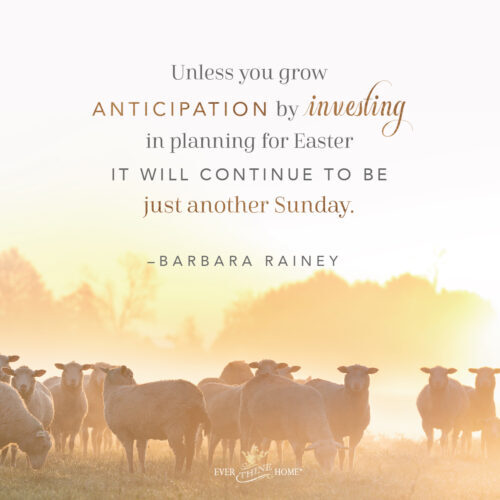
So come on. Join us at Ever Thine Home in making much of Easter this year. Start building anticipation in your home today and it might just deepen faith in each of your family members. And wouldn’t that be worth the effort?
What do you do for Easter? What does your church do? We’d love to hear from you … just leave a comment at the end of this post.
The post Anticipating Easter: Waiting With Eagerness appeared first on Ever Thine Home.
March 20, 2023
Anticipating Easter: Wearing White on Resurrection Sunday
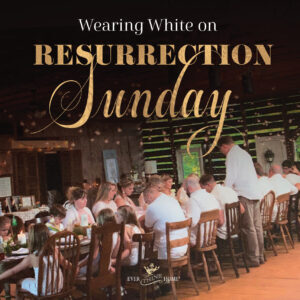
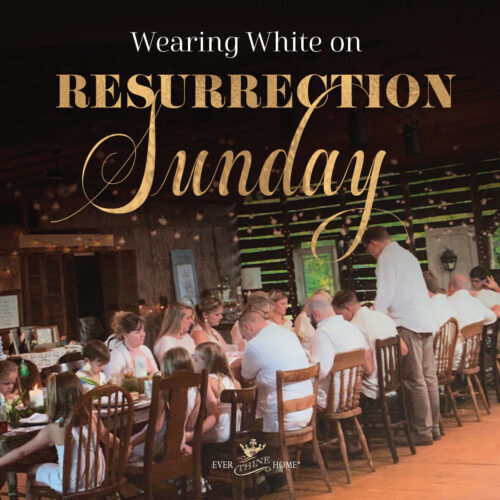
I was working outside on a glorious spring day when out of nowhere I started thinking of the words to an old Easter song by Irving Berlin that I remember from my childhood:
“In your Easter bonnet, with all the frills upon it,
You’ll be the grandest lady in the Easter parade.”
And then I thought, “How typical of us, especially as women, and particularly me, to make Easter about fashion and how we look.”
I loved making or buying adorable new dresses or little suits for my children for Easter Sunday. New clothes help us set apart a special occasion. Nothing wrong with that.
But I realized in hindsight that I had another motive—I wanted my children to be noticed for how cute and adorable they were. Not exactly the devotion to Christ that Resurrection Day deserves. Happily there is grace for my shortcomings and mixed motives.
Today it’s common for women and children to wear pastel or bright-colored dresses for Easter (if they wear anything special at all to mark the occasion). But this year I’d like to suggest you consider reviving an old tradition by wearing white for Easter.
And at some point in recent decades, it seems, the meaning of wearing white on Easter was lost. As I thought about it, I realized that somewhere, someone understood that believers in Christ will one day wear white linen in heaven. Wearing white for the first time on Easter Sunday symbolizes not only our future, but also the dramatic change from the dark drab of winter to the clean newness waiting for us because of the Resurrection.
By sporting some white, we declare our identification with Christ, our hope for the future, our joy in this greatest victory of all history. This is the imagery in verses like:
Revelation 3:4: “ … they will walk with me in white, for they are worthy.” Revelation 19:14: “And the armies of heaven, arrayed in fine linen, white and pure, were following Him on white horses.”

So as you prepare for Resurrection Sunday, go ahead and plan something new to remind you of your new life in Christ. And something white, to remember that “though your sins are like scarlet, they shall be as white as snow” (Isaiah 1:18).
But make sure your heart is focused on celebrating the Savior, not on being the grandest lady with perfectly adorned children in church on Easter Sunday.
Christ is risen!
What do you do for Easter? What does your church do? We’d love to hear from you … just leave a comment at the end of this post.
The post Anticipating Easter: Wearing White on Resurrection Sunday appeared first on Ever Thine Home.
March 13, 2023
Anticipating Easter: Tune Your Hearts to Worship


To celebrate well, we must plan to celebrate.
Weddings, birthday parties, graduations; baby or building dedications, grand openings, awards ceremonies; all require weeks or months of planning. We brainstorm, research, make reservations, recruit friends to help or hire event planners.
Easter is next month! Would you be willing to do some planning to make your family’s Easter experience memorable? What about investing in making your church’s celebration a really big deal?
Preparing for Easter is both personal and corporate. We start by paying attention to our own hearts; focus on what Jesus did for you alone by reading devotionals like the ones I recommended last week. Prepare your home to reflect the season and your faith with ideas I wrote about here. But we can also invest in our churches; helping the church staff, who are always busy in this season, can make Resurrection Sunday a celebration like no other at your church.
Here are a few ideas for your own heart preparation and for your church.
1. Make an Easter playlist for yourself or your family of your favorite hymns and songs that focus on the cross and the Resurrection. Interestingly, in other countries Christians don’t play Easter music until after Resurrection Sunday. They reserve it for the actual day of Easter’s celebration and then listen in the weeks after Easter to keep the joy fresh and alive.
Choose the music that sets the mood for you. We have a playlist here. Or check out musician Andrew Peterson for some good ideas for song options. Listen for yourself and your family in the weeks before and after Easter.
But especially on Easter Sunday, play your favorite Easter songs all day in your home and during your planned celebrations. I encourage you to respond to the miracle of the Resurrection with feasting and with exuberant dancing, clapping, or singing together. Easter is a day to party like no other!

2. Help your church make Easter Sunday memorable. Start by understanding that most churches have made their Easter plans months prior. Walking in at this point with grand ideas might not be well received if it feels like more work for them. So begin by deciding who to talk to and then ask that person, probably not the pastor at first, what has been planned already. Ask if they need help with what is already in the works.
Then once you have heard from them you can propose your ideas. And always bring your ideas with plans for how they can be accomplished already worked out. Pastors and their staff are frequently inundated with a thousand ideas for changes and new ideas from members but rarely do the ideas come with “How can I help?” attached. And if there’s not any time to implement your idea this year, try again next year … but earlier.
To get you started on ideas for your church here is one that’s not too complicated.
A good friend of mine, Andrea, a pastor’s wife, said Easter at their church is a grand party. They shoot confetti cannons and encourage all the members to bring bells to ring and banners to wave to enhance the celebration. One year they even gave everyone a cake pop as a party favor on the way out of the service.






Would you be the one willing to organize some volunteers and talk with your pastor about how you can throw a big Easter Sunday party at your church too?
Easter Sunday is a great day for believers to celebrate collectively all over the world. But more importantly, it is a day for us to declare to the world that Jesus is alive! If we make much of Jesus, if we celebrate publicly, noticeably, and joyfully in such a way that those who don’t know him watch and wonder, might our day be a witness to the world?

Truly, Easter should be an enormous celebration.
Join us this year in honoring Christ’s sacrifice and His Resurrection with exceptional merriment. May this Sunday be unlike any other in the church calendar all year long.
What do you do for Easter? What does your church do? We’d love to hear from you … just leave a comment at the end of this post.
The post Anticipating Easter: Tune Your Hearts to Worship appeared first on Ever Thine Home.
March 6, 2023
Anticipating Easter: 14 Ideas to Make Easter Memorable


Easter is the holiday that sneaks up on us and finds us unprepared.
Why does it happen every year?
Here are a few reasons that might help put it all in perspective.
While Christmas has nearly six months of anticipation–decorative and gift items start appearing in stores in late summer—Easter gets little advance marketing support from the retail world.Making Christmas meaningful and memorable for families is easier because schools close for two or more weeks. In contrast, our children might get Good Friday off from school (but not everywhere).The date of Easter changes every year, making it more challenging to remember and plan ahead. How often have you asked, “When is Easter this year?”And then there’s money. Too many of us spend a lot of money on Christmas—traveling to visit family, buying big gifts, perhaps even taking a ski trip. We don’t budget money for Easter like we do for Christmas.To help you rethink this imbalance, here are some questions to consider:
Do we over-celebrate Christmas and, as a result, have too little energy, desire, or emotion left for the most important holiday of the year?
Do we take a minimalist approach to celebrating the greatest event of history? Have you ever considered that we ignore what Jesus commanded us to do–remember His death (1 Corinthians 11:23-26)? He never asked us to commemorate His birth.
Does the emphasis on Christmas far surpass what you do for Easter in your house? It certainly did in mine for most of my adult life. Like many, I didn’t really know how to celebrate Easter. I needed a vision for how to make much of this important holiday.

So I want to challenge you to rethink this holiday with me. Ask God to help you rightly balance your attention to His greatest miracle, Easter, with some of the same attention you give to celebrating His birth.
I invite you this year to become Easter people for whom the cross is everything!
Start today to think about what kind of Easter celebration you want to plan for your family.
Do you want something cozy and intimate with your nuclear family?
Do you want a larger Easter lunch or dinner with your extended family?
Do you want to go all out and plan something big with friends and neighbors, or with your church?
If you decide on a group celebration, start talking to friends who might want to join you and find a partner with whom to share the work and joy. Will you want to include a grand lunch or dinner feast? Begin now to think about the location, menu, decorations, and responsibilities.
Plan meaningful decorations for your home. Most decorations you’ll find in stores focus on eggs, bunnies, and baby chicks, but none of these directly tie into the Resurrection.
So here are some ideas to help you plan for a meaningful celebration this year. I’ve also included a number of links to helpful resources. You might want to print this list and mark the ideas you want to try and then mark your calendar with deadlines and to-dos for making it happen.
1. Create anticipation with a countdown to Easter. Help your kids make a traditional numbered paper chain. They can tear off one paper loop each day. Let them each hang one in their room. Or get our Behold the Lamb Kids Lent Countdown, a digital download activity kids will love.
2. Hang our new I AM calendar in your house. These beautiful images of the names of Jesus—like “I AM the Bread of Life” or “I AM the Lion of Judah”—can adorn your home during the Easter season and even all year long. (Images fit in standard 11×14 size frames.) Look for this calendar in our Etsy store.
3. Organize a church or neighborhood egg hunt, using Resurrection Eggs from FamilyLife. This best-selling resource is a great tool to explain the true meaning of Easter. Kids as young as three or four can begin to remember what all the tiny pieces in the eggs mean.
4. Plan to help your kids reenact the Palm Sunday story or the Good Friday story. Read aloud the story in John 12 and John 18-20. Encourage them to create costumes and even the scene if you have the space.
5. Invite your friends over for a DIY craft night to make these Easter candles. Use them as décor on your kitchen or dining room table to use during Holy Week. If you can find a piece of old fencing or barn wood, write “He is Risen” in white paint on the board and display it on a fireplace mantle.
6. Observe Passover. This traditional Jewish event celebrates God passing over Jewish homes when He punished the nation of Egypt by enslaving His people. For followers of Christ it also prefigures Jesus’ passing over our sins through His death and Resurrection. This was a significant part of Holy Week; what we call the “Last Supper” was a Passover meal.
This year Jewish Passover is on April 5-12. For recipes, a dinner guide, and activities, click here.
7. Watch the Jesus film. Dear friends of ours, Tim and Darcy Kimmel, watch the movie on the day before Easter and take communion together as a family. Watching the story of Jesus every year will make Easter far more meaningful. You can watch it here.
8. Observe Holy Week. Starting on Palm Sunday, I will be posting blog posts every day during Holy Week that your family can use for devotions. Light your pre-decorated candles as you read the stories.
9. Attend your church’s Good Friday services. At home either before or after church, talk about Jesus’ death on the cross by reading the story in one of the four Gospels. Tear a handmade curtain or a length of muslin fabric to explain the ripping of the veil in the temple. At noon, close all your curtains and blinds to make your house dark. This is the hour when the earth went dark. Leave your house dark until Sunday morning to further the impact. Then on Easter Sunday to symbolize Jesus rising from the dead, serve Tomb Cake, or make special pancakes to illustrate the empty tomb.
10. Send an Easter care package. If there’s someone you’d love to spend Easter with but distance keeps you apart, drop a meaningful gift in the mail to them.
11. Include truth-telling gifts in your children’s Easter baskets. Look in our Etsy store or a local Christian bookstore for gifts that speak to the truth of Easter.
12. Prepare a special feast. Find an Easter menu online or ask friends for ideas. One of our favorites for our Easter meal is Spring Salad. Here’s the recipe if you’d like to add it to your menu.
Then create a grand tablescape for your feast in a gold and white color scheme. (Look for an example in this video.) Gold reminds us of our victorious King and white represents the purity of His perfect life and the purity that will be ours one day.
Your décor doesn’t have to be expensive. Set the DIY candles on blocks of wood to create varying heights. Fill mason jars with white roses, white hydrangeas, or even baby’s breath. If the weather is glorious, eat outside with gold-rimmed paper plates, gold plastic silverware, paper cups. We even found gold-striped paper straws for our photo shoot. A backyard picnic setup gives the kids space to play when the feasting is over.
13. Don’t leave too much work for Holy Week.
Plan ahead and create “to-do” lists so that you’re not swamped with work the last few days before Easter Sunday. Decide what clothes you and your family will wear, and purchase any new clothes a couple weeks ahead of time. Plan your meal and prepare any food that could be frozen.
14. Prepare your heart, too. Don’t just plan the event, but ready your heart as well. I suggest reading one or more of these wonderful books in the weeks leading to Easter to help you ponder the uncomfortable truths of Jesus’ death and burial:
Word in the Wilderness, by Malcolm GuiteThe Passion of Jesus Christ, by John PiperShaped by the Cross, by Ken Gire40 Days of Decrease, by Alicia Britt CholeA Violent Grace, by Michael CardReliving the Passion, by Walter Wangerin, Jr.Tempted and Tried, by Russell Moore

Allow yourself to feel just a hint of His agony, His suffering, His pain. Walk away from the cross with the disciples who were shocked at His death, whose hopes were dashed, whose fears were crippling; their despair and depression deep and debilitating.
This is very good for your faith! Don’t rush past thinking about what Jesus did for you.
Then you will be ready for Sunday’s dawn. Then your joy on Resurrection Day will begin to match the disciples. Then the world will know that you have been with Jesus. That your life has been changed forever.
Christ is risen!
What do you do for Easter? What does your church do? We’d love to hear from you … just leave a comment at the end of this post.
The post Anticipating Easter: 14 Ideas to Make Easter Memorable appeared first on Ever Thine Home.
February 27, 2023
What Husbands Need to Know About Their Porn Use


Note from Barbara: I’m pleased beyond words to welcome my son, Samuel Rainey, to the Ever Thine Home blog page. I could write thousands of words about this man whom God has gifted uniquely to help men and women traverse choppy or turbulent waters in their marriages and lives. As a marriage and family therapist for 15+ years he has learned much in his practice of listening and listening and listening. A great counselor helps the seeking one find truth, discover the path, and see with understanding on their own so that it sticks for life. Samuel is a man of deep wisdom.
Today’s post topic is a sad reality for many marriages today. If it’s not for yours or your own life, read it anyway because you do know someone for whom this is a deeply challenging struggle. We need one another to please share this sensitively and compassionately with those you know. We are stronger resisting the evil one when we aren’t alone.
It’s a delight and a gift to share Samuel with all of you.
It’s Friday afternoon, and I’m wrapping up my work week before I head home to help my wife setup for a birthday party. Just as I’m about to lock up, my office phone rings.
I hesitate to pick it up. I am usually finished with my office work by this time on Fridays, but today’s work has lingered. In my 15+ years of working in the counseling field, I know that calls from clients after Thursday night tend to be heavier, as whatever they’re facing at home looms large with the weekend approaching.
My work today is not yet finished.
Almost immediately upon answering the phone I hear the fear in Jim’s voice. He launches into a panic-filled story about the lunch just had with his wife. “She found out about my porn struggle last night, and is telling me she is thinking about leaving, and that she is done trying with me.”
He’s ashamed, scared, and desperate to come in and see me for counseling. After several minutes of discussion we set up an appointment for the following week. Referencing Proverbs 1:5, I tell him to be patient and wait until we meet before he makes any promises or disclosures to his wife. Too often men respond reactively when confronted in a situation like this, and it makes the relationship with their wife worse, not better.
I spend a few moments reflecting on the conversation. Jim said a few things about his situation that stuck out to me, and I make a note to address these comments. As I write down these four specific areas to revisit with Jim next week, I realize that they apply to countless other men I have worked with over the years who have been in a similar situation.
When Jim and I get together in person, I share these four statements about his porn use. They were extremely helpful for him in his understanding, responsibility, and healing.
1. It is not about your wife.
In our phone call, Jim said he thought his porn use had something to do with his wife’s appearance and availability to have sex with him. Genesis chapter 3 speaks specifically to this dynamic between a husband and a wife who Jim unknowingly referenced with his comment. When God finds Adam and Eve after they sinned, he comes to Adam first and asks him a series of questions to which, in verse 12, he blames Eve for his actions (hello, shame). “The woman you put here with me—she gave me some fruit from the tree, and I ate it.”
The first and foremost problem with blaming your wife for your porn use is that no one enters into marriage sexually pure. Everyone has a story of some kind of sexual brokenness or harm. We all have sexual baggage, and porn is a certain kind of sexual baggage.
The overwhelming majority of men bring a history of porn into the marriage. There have been very few instances when I have heard a man speak about developing a porn habit or addiction after getting married. Now it’s possible that porn usage increases after marriage because of a husband’s inability to handle a variety of factors: disappointment in sex, performance issues, or frequency of sex. While it would be nice and clean to put the blame on the wife, that’s not really what’s happening. She’s not the problem.
Porn use happens because it’s easy. For men, there’s no risk of rejection. When you pursue your wife sexually, there’s a chance it won’t go the way you hope/want/need. There is a possibility of rejection. The viewer of porn never experiences this pain of failure. Porn says, “You can come as you are. You are welcome here. Alone. Tired. Afraid. Ashamed. No problem. You’re okay here.”

Sex with oneself is infinitely easier than with another person, but it’s also infinitely emptier. Sex in real life is rarely easy. It’s very vulnerable, and the possibility of rejection or failure is ever present. But it is this vulnerability and risk that make sex in a marriage a unifying, healing, and connecting experience. Porn is about your own sexual story, not about what your wife is or isn’t doing.
2. Porn use happens because of your shame.
In Genesis, when Adam and Eve recognize they are naked, they feel shame for the very first time. The natural response to shame is to cover up and hide. Shame is the feeling that there is something wrong with me. That I am bad. I keep doing things that are painful to myself and/or others, and only bad people do those kinds of things again and again. Because of this, I feel the toxic shame of being bad.
Porn often begins a spiral of shame. You look at porn as a readily accessible way to forget about the deep disappointment in yourself. But when the porn binge/use is over, you are on your own to face the mess in you emotionally, and physically. This is when the tidal waves of guilt and shame come with great intensity. A great reprieve from this toxic shame is to soothe oneself, and what better way to do that with someone on the screen that will always say, “Yes”? It’s a downward spiral that is difficult to stop.
Shame keeps us from connecting with other people. And this isn’t just about porn. Anyone who deals with shame has trouble being in caring, intimate (not just sexual intimacy), vulnerable relationships. We were created for relationships, and if one is too shameful to have real relationships, porn is a momentary outlet for this longing and need. But it is a fractured and broken way of feeling connection.
At the end of Genesis chapter 3 we see the unique consequences of sin for both Adam and Eve. For Adam, his consequence centers around the fulfillment of his life through his work and provision. Verse 17 says:
“Cursed is the ground because of you; through painful toil you will eat food from it all the days of your life. It will produce thorns and thistles for you, and you will eat the plants of the field. By the sweat of your brow you will eat your food until you return to the ground, since from it you were taken; for dust you are and to dust you will return.”
His consequence of work and provision provokes a shame in him that threatens everything he desires for his life. This shame says that he is incomplete, incompetent, and without potency. He will toil in the fields to produce food. Nothing will be easy, peaceful, or without challenge.
I think this consequence applies to more than Adam’s toil in the fields. The sex he enjoyed with Eve prior to his sin provoked no concerns of rejection, no worries of “being enough,” and no possibility of revenge actions aimed at fulfilling his needs at the expense of Eve.
Now that his sin has changed the world, it has changed his life. His nakedness will now have rejection as a possibility. He might not have “enough” to woo his wife. She will be uninterested in him, and he will be enraged with the shame of impotency (in the curse for Eve, God tells her that her husband will “rule over you,” which implies a sense of dominance, violence, and rage against his not being enough for her). As a result of these painful feelings, he will look for ways to easily satisfy his longings.
What is easy? Sex without the possibility of failure. What kind of sex is always without failure? Porn. It’s a one-way street with no possibility of the man’s desire being shut down. Porn answers the question for him, “Yes, you are enough.”
3. Porn use is cheating.
One of the most problematic dismissals I hear about porn is that it is better than having an affair. Most men are smart enough to not say this outright (or consciously think this), but if you believe that using porn isn’t cheating, you are effectively saying that it’s better than going out and having an affair.
Hebrews 13:4 exhorts husbands and wives to avoid behavior that defiles the marriage bed. The Bible does not specifically mention pornography (or masturbation for that matter) but it does speak directly to sexual immorality. The modern culture would have you believe that porn is an act that does not harm anyone; in fact some believe the use of porn in the marriage relationship enhances the sexual experience between husband and wife. But the marriage bed is the sexual relationship between you and your wife, and the use of porn brings other people into your marriage bed. This is the very definition of adultery.
Porn use is cheating because it involves meeting sexual and emotional needs in a relationship outside the marriage. Yes, to some it might not feel as devastating as an affair, but it’s incredibly problematic for a couple to deal with the effects of porn.
Studies show three significant issues that come from porn usage. First, the more men use porn, the less successful they are in their intimate relationships. Second, they tend to have (and need) more sexual partners in life. Lastly, they confuse sex with something that is relationally experienced with something that is watched. Sex becomes about orgasm, not about connection. This habit of watching sex transforms people into objects, and connections into transactions. In this framework, men and women become nothing more than genitalia.
4. Healing does not happen in isolation. It requires community.
Keep heart—there is hope. First John 1:9 reminds us to keep heart and respond to the forgiveness that is available: “If we confess our sins, he is faithful and just and will forgive us our sins and purify us from all unrighteousness.”
Usually porn is viewed in secret and isolation. The easiest thing to do is attempt to correct this behavior in secret. However, I’ve yet to meet a man who has healed from the use and effects of porn on his own.
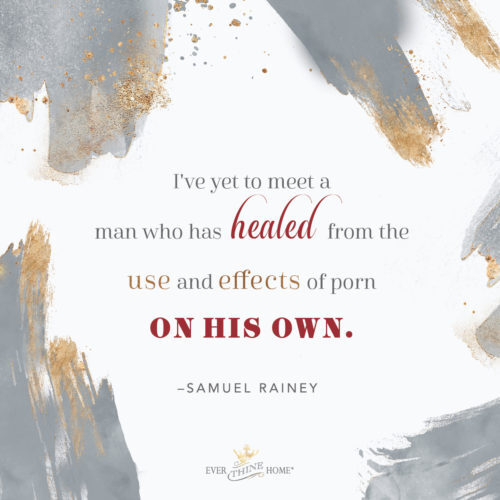
Healing always requires community. Recovery happens in relationships, not in isolation. Community is a direct assault on toxic shame. Evil cannot thrive in a community that is oriented towards hope, healing, and forgiveness.
The men, women, and couples who attempt to recover on their own from their sexual brokenness face an impossibly difficult uphill ascent without any safety gear to keep them from falling. The impact of porn is such a personal and shameful experience (for both husband and wife), the last action most want to take is to invite others into that process. But that is the only way that I know of how healing and forgiveness take place.
Don’t try to do it alone. Join or start a recovery group. Seek professional counseling. Get help! Talk with a friend, invite them into a healing process with you. You’re not alone: The Barna Group found that 73 percent of men ages 18-49 view porn once a month. So others are waiting to be invited into the light of day, just like you are.
Jim left my office after that first appointment with a list of three things that he was going to do. He committed to finding three men that he could share with about his struggle, join a recovery group at his church, and begin working on his sexual history.
The biggest thing I wanted Jim to walk away with from our time together was a focus on his relationship with God, not with his wife. When he is able to square himself up with God, the relationship with his wife will take care of itself.
It was easy for him to feel like he needed a miracle with her that first week we started working together, but he didn’t get to that place over night, and he was not going to address all the challenges with his marriage overnight, either. Change happens with small and consistent incremental adjustments that take place over an extended period of time. Don’t try to rush the process, seek guidance, and as the Psalmist says, wait patiently for the Lord.
Learn how you can step up to the responsibilities of manhood in Dennis Rainey’s new video series, “The Call to Courageous Manhood.” Dennis talks about the five steps of manhood and provides biblical and practical encouragement on what it means to be a man. Go to CalltoCourageousManhood.com .
The post What Husbands Need to Know About Their Porn Use appeared first on Ever Thine Home.
February 20, 2023
What Wives Need to Know About Their Husband’s Porn Use


Note from Barbara: I’m pleased beyond words to welcome my son, Samuel Rainey, to the Ever Thine Home blog page. I could write thousands of words about this man whom God has gifted uniquely to help men and women traverse choppy or turbulent waters in their marriages and lives. As a marriage and family therapist for 15+ years he has learned much in his practice of listening and listening and listening. A great counselor helps the seeking one find truth, discover the path, and see with understanding on their own so that it sticks for life. Samuel is a man of deep wisdom.
Today’s post topic is a sad reality for many marriages today. If it’s not for yours or your own life, read it anyway because you do know someone for whom this is a deeply challenging struggle. We need one another to please share this sensitively and compassionately with those you know. We are stronger resisting the evil one when we aren’t alone.
It’s a delight and a gift to share Samuel with all of you.
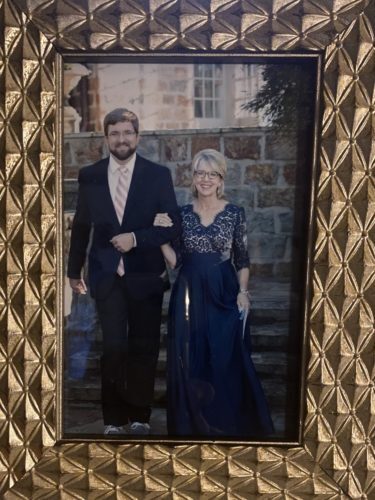
This is my favorite picture of Samuel and me that sits on my desk.
Several years ago, I got a call from a man who was in a mild panic after his wife caught him looking at pornography. A few months into our work together, Jim asked me if I’d be willing to meet with him and his wife, Sarah, together. He told me that Sarah was struggling to understand why he’d been using porn for so long, and what she needed to do about it.
After I met with the couple, it became clear to me that there is a huge misunderstanding about porn usage as it relates to the wife. The majority of women who come into my office really struggle to understand porn. More importantly, they struggle to know what they can do to help.
I often hear wives ask questions like: “Do we need to have more sex?” or, “Why am I not enough?” or, “Why can’t he stop for me?” Sarah was asking some of these same questions. Here are the four things I told her that wives need to know about their husband’s porn use:
1. It’s not about you.
A common belief is that husbands wouldn’t use porn if their wives were more beautiful or more available for sex. But porn is almost always something that is brought into marriage. I can only think of a few stories over the past 15 years of working with couples when porn use started after marriage. Because porn is a “pre-existing condition,” it really doesn’t have anything to do with the wife “being good, sexual, or beautiful enough.”
Genesis tells the story of God creating man and woman in His image (Genesis 1:27). Porn distorts this truth. It perverts the dignity of both men and women. A man’s use of porn is between he and God, not a statement about you or your dignity.
Evil wants to convince men and women that we are sexual objects, not sexual beings. If we are sexual objects, then sex can become a commodity to be marketed and sold. It is becoming increasingly difficult for men to develop a God-created view of human sexuality.
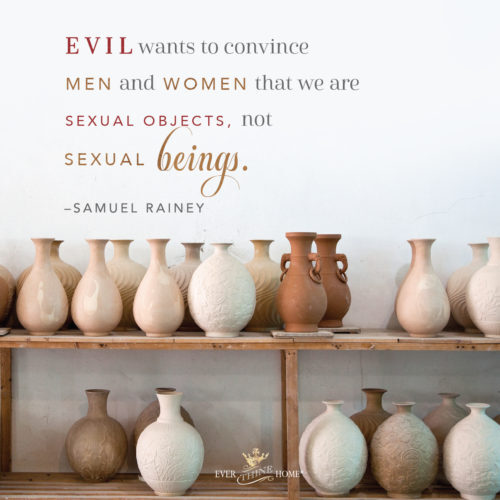
When you make his porn use about you, you put yourself in the middle of the problem. And if you’re in the middle of the problem, then it is up to you to solve it for him. Many women unknowingly insert themselves between their husband and God in dealing with recovery from porn. Don’t do this. Don’t make it about you. Your husband has his own sexual recovery process that will involve you, but it is not about you.
2. Porn use is about shame.
Sarah was having a difficult time understanding why her husband, Jim, couldn’t stop his porn usage. Nearly 15 years into their marriage and he admitted to looking at it once or twice a month. She thought he should be able to stop because “it’s not what godly men are supposed to do.” Here’s what she was missing. Jim had a long, complicated relationship with porn that started when he was 10 after his dad left the family.
His porn use had very little to do with “being a godly man” and had way more to do with an unreconciled trauma that occurred in his childhood. Every man has a story that answers the question “Why am I using porn?” And every story will have shame at the center.
Shame is the feeling that says, “Something is wrong with me, and I need to get away from this.” After Adam and Eve sinned, they recognized their nakedness and hid from God (Genesis 3:7-8). What an awful feeling that must have been! They sewed fig leaves together to hide their nakedness, first from themselves and then from God.
Porn is a form of fig leaves for a man. It’s a poor attempt at hiding a God-sized problem. It temporarily hides the painful truth that he’s naked. It hides his vulnerability and the reasons that he is in pain. For a few brief moments, his shame disappears amidst the pleasureful fantasies taking place on the screen, or on the pages.
Your husband’s porn use is an indicator that he is in a tremendous amount of pain, and needs some form of relief. Depending on his story, he might not emotionally know another way to relieve that pain outside of looking at porn. This is no way excusing his behavior. Paul speaks directly to this in Romans 6:1: “Are we to continue in sin that grace may abound?” What I am suggesting is that he has enough pain and shame on his own to deal with. He doesn’t need more from you.
Shame doesn’t last very long in an environment with grace and empathy. God doesn’t turn his back on Adam and Eve when he finds them hiding in the garden. He doesn’t shake his head with disdain. He doesn’t lecture them. He doesn’t imply that they should have acted differently because they knew better. What does He do instead? He sacrifices an animal to clothe them (Genesis 3:21). And then He protects them by disallowing their ability to live forever by eating from the tree of life (Genesis 3:22). When we fail God, He returns grace, mercy, and love. This is the invitation for wives as well.
But here’s the problem: Wives often can’t give the gift of grace and empathy to their husbands because of their own stories. Without doing her own work of healing, she will not be able to offer empathy. She will resort to her own coping mechanisms and will likely make his porn use about her.
So tend first to your own story. Engage in your own healing work so you can know how to be in relationship with your husband without enabling, or shaming him.
3. Having more sex can cause more harm.
This is a delicate topic as withholding sex can be harmful just as the use of porn is. Some errant advice given to wives of porn addicts is that they need to make themselves more sexually available. The not-so-subtle hint here is that more sex is the secret to keeping the husband from acting out with porn.
In short, this is awful advice. It invites the fantasy life of porn into the marriage bed, and says that the wife’s lack of sexual availability is the problem. If someone gives you this advice, run away. God came looking for Adam first after sin entered the world. He did not ask Eve to account for her actions as reason for Adam’s sin. His sin is his sin. Your sexual story is influencing your husband’s, but it is not the reason for his choices.
Women do not need to be more sexual for their husband to keep him from fulfilling his needs elsewhere. This is enabling behavior. It makes the wife responsible for the husband’s sexual maturity. Most would not want an affair partner in their marriage bed with them, but this is exactly what the advice to “become more sexual for him” is doing. It brings a fractured sense of intimacy into a sacred space meant to be shared only between husband and wife.
There needs to be hard work and conversations about the harm that porn has caused in a relationship before sex can be trusted as an expression of love and commitment. Sex without love and commitment is a form of power and control. This comes closer to using each other for pleasure as opposed to loving each other with pleasure.
This does not mean that couples need to stop having sex altogether if porn is present. Do not limit sex as a form of punishment or control, and do not give in to having more sex just to make things better. If you find yourself struggling to know the balance here, seek professional help to establish healthy boundaries.
4. Porn use is cheating on your spouse .
Though men are resistant in accepting this, porn use is just like having an affair with another woman. It is taking the most trusted and vulnerable act that a couple can share together, and expressing it elsewhere. Yes, it’s kind of a “one-way” relationship as the images provide no relational feedback, but it is still taking the sexual embrace outside of the marriage bed. Most of the men I talk to initially resist the label of porn as an affair. I think this mainly relates back to point two and the shame they feel.
Jesus says in Matthew 5:27-28 that a man looking lustfully at a woman has already committed adultery in his heart. Porn takes this a step further and moves it from just an issue with the heart to becoming an issue with the body. There is a spectrum of pain and ease of recovery that couples face when an affair enters the picture. Affairs of the heart (emotional connection, attachment, infatuation) are always the most painful and difficult to recover from. Affairs of the body (sexual contact, fantasy-induced orgasm, “solo sex”) tend to be simpler and easier to understand. Affairs of the mind (fantasy, lust, escape) afflict us all.
Porn use is an affair of the mind and body. Instead of working out the issues of the relationship in the context of the relationship, fulfillment of sexual needs and desires are engaged outside the marriage. One of the more difficult realities of porn use is that sex between a husband and wife now includes the images, videos, sounds, and sexual impulses experienced when previously viewing porn.

Lastly, don’t wait to seek help. It’s been my experience that couples wait 4-6 months too long to seek help for the problems they are unable to resolve on their own. Don’t go at this alone.
Get help even if your husband won’t. It’s not an easy topic to address, but it’s not impossible to heal from. Be patient, take your time, and work hard to find a path forward towards wholeness, forgiveness, and reconciliation.
The post What Wives Need to Know About Their Husband’s Porn Use appeared first on Ever Thine Home.
February 13, 2023
4 Tips for Recovering Oneness in Your Marriage


It was a warm, early summer day when Dennis invited me to go to lunch. We’d known each other as friends for three years in college. But we hadn’t seen each other in a year since graduation, so we had a lot to catch up on.
One lunch wasn’t nearly long enough. So he invited me to go on a picnic the next day. And a picnic still wasn’t enough. On the way back to my apartment, he asked me to go to church with him the next day.
And so began a month of daily dialogue, sharing rides to work, dinners, and walks after dinner. The talking never ran dry. He listened to me as it seemed no one ever had. I felt comfortable with him like no one else. Our relationship was easy and natural.
Within two months, this long conversation led to a decision to get married … a conclusion we both reached after praying for God to show us His will for our lives. And six weeks after that we were husband and wife.
But like every married couple since Adam and Eve, we found ourselves in places where our relationship no longer felt so easy and natural. The romance and joy of our early marriage was replaced by discomfort, disagreement, and difficulty we never saw coming. The springlike oneness that was so real when we married dissipated like dew under the midsummer sun.
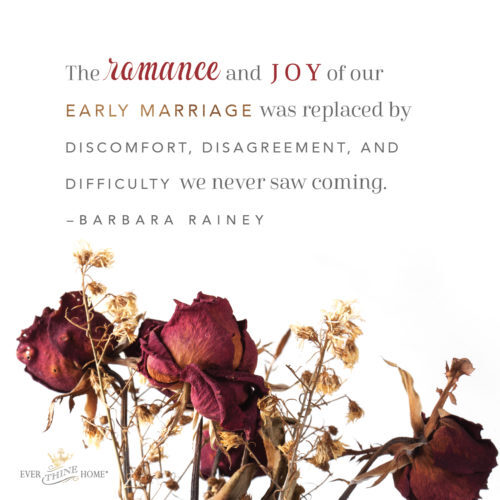
How do we move from the excitement of the “I do’s” in our wedding vows to a determined, expectant and equally excited conviction of “We still do”?
According to a dictionary, oneness is the “state of being unified or whole, though comprised of two or more parts.” I like another definition better: oneness is an invisible, transcendent quality of peaceful harmony.
Why is this definition helpful? Because it is what God intends for you. Experienced perfectly by the Trinity, it is also what Jesus prayed for us (John 17:11). And we surely need His prayers—we married couples are not just imperfect but also incapable of achieving the oneness we desire without His work in our lives.
It’s not impossible to recover oneness in our relationship. After all, we’ve experienced oneness before. The answer is going to Him, the source of what we need.
Ask God to reveal the truth. A heart examination is the first place to start. And not your spouse’s heart. Examine your own. It is the special work of the devil to divide us and make us see our spouse as the enemy. Jesus called Satan the father of lies, so start by asking questions like:What lies am I listening to? What lies am I believing?Am I assuming the worst about my spouse?In what ways have I contributed to our problems?Have I acknowledged my mistakes or have I acted as if everything is his or her fault?It’s often difficult to recognize the mistakes you’ve made in your marriage. Begin by praying for eyes to see what is in your own heart.

But one day I realized I should be grateful that my husband wanted me to go with him. Then I knew I needed to have a conversation with God first. I asked God to help me be positive and not negative about my husband’s desire. I asked God to help me enjoy this side of our relationship, to enter into these travel experiences with my husband as gifts. Of course I haven’t done this perfectly, but I am not the same person I was.
A few years ago Dennis told me he felt reluctant asking me to go on work trips with him. I knew I had changed and that he was replaying old mental tapes from the past. So I gently reminded him I was not as I once was. And he agreed. And there are old messages I hear in things he says, too, when the truth is he has changed a lot over the years.
Ask God for patience with growth in oneness.Isaiah 61:3 calls us “oaks of righteousness,” but oak trees don’t grow overnight. Christian maturity takes place over a lifetime of walking with God. You want your oneness to have the strength of an oak, not the perishable quality of a squash vine.One conversation with your spouse will not magically restore the oneness you once enjoyed. It may require countless additional conversations. In God’s hands and timing, He will work the good you desire with increased oneness being the result.
As you work toward oneness in your marriage, begin where you are. Risk talking about the hard things with your spouse because when you work through these obstacles, the joy on the other side is so worth it. It’s what will allow you to enthusiastically say together, “We still do!”
So pray for God to grow you together. Offer this prayer as a start:
Jesus,
We married for oneness,
companionship indivisible.
Increase my vision.
May our marriage be
all that You imagined
when You brought us together.
For Your glory and our good.
Amen.
The post 4 Tips for Recovering Oneness in Your Marriage appeared first on Ever Thine Home.
February 6, 2023
Questions to Help You Share Your Story


Everyone has a story … a fascinating tale involving adventure, laughter, courage, pain, and romance.
You have such a story, and so does your spouse. Sometimes you just need the right questions to help you share your stories, as well as write together the intriguing saga of your shared life in marriage.
For example, how would you answer the following question:
If you could keep only one memory from your childhood, what would it be, and why?
A question like this may unwind a long spool of memories … of trips you took as a family … of holidays with cherished loved ones who may have passed on years ago … of younger versions of your parents and your siblings … of adventures you enjoyed with childhood friends … and so much more.
And then think of answering a question like this on a date with your spouse, sharing memories you haven’t thought about for years, and then hearing his or her own answer.
Questions like this are not just a tool for better communication. If you capture your answers in writing they can also help create a lasting record of your relationship and your family. They can guide you to deeper transparency with each other just as Adam and Eve were completely open and honest before the Fall. Uncovered both physically and emotionally, these original lovers shared a perfect intimate relationship.
In our fallen world, finding such transparency is a struggle. But what enjoyable work–sharing in the unfolding plot of a story designed uniquely by God for just the two of you!
To encourage and help you take this path toward openness in your marriage, Dennis and I wrote 52 questions that are available to you in a very short weekly email. You can receive these emails free by clicking here.
Here are a few ideas to get the most from each question:
Remember to consider the right setting. We suggest you establish a personal, private, and special meeting place, and agree on a morning or evening sharing-time together. Some suggestions:Talk over a cup of hot tea or coffee at home.Meet somewhere for a lunch date, with plenty of time to go over a question or two.Set aside some time at night after the kids go to bed.Go out on a weekly date night.Get away for a weekend and talk. Write down your answers and date them in a journal. You’ll find that your answers will become more important to you as the years go by. And you’ll answer them differently next year or in five years.Write down the words that your spouse uses frequently to describe feelings.Take turns writing – the husband recording his wife’s responses and vice versa.Write down additional questions that come to mind during your time together. Remember to listen. Look each other in the eye as you share and talk together.Listen … and seek above all else to understand your spouse.Listen … and rephrase your spouse’s answers when appropriate.Listen … and don’t retreat when it feels uncomfortable. Share what’s really important.Listen … and try not to defend yourself if the conversation becomes uncomfortable. Remember “winning” is not the goal; understanding is.Listen … and don’t react negatively to your spouse’s answers. Instead encourage each other to share deeper feelings by asking more questions.

May you see growth over this next year of 52 weeks and may you always keep investing in each other! Your marriage will benefit. Your children will benefit. And the ripple effect of a growing marriage will spill over onto others too.
Come grow old with me!
The best is yet to be,
The last of life,
For which the first was made.
Our times are in His hand,
Who saith, ‘A whole I planned,
Youth shows but half;
Trust God: See all, nor be afraid.’
Robert Browning (1812-1889)
The post Questions to Help You Share Your Story appeared first on Ever Thine Home.
January 30, 2023
Dear Barbara: How Can I Respond to a Husband Who Isn’t Trusting God as He Should?

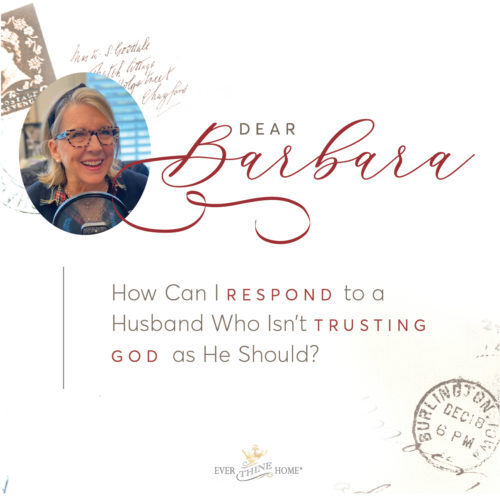
Dear Barbara: How do I still respect my husband when I feel like his lack of faith negatively affected the plans God has for our family? Don’t get me wrong; my husband is a strong believer. And there’s not a big sin issue. I just feel like he isn’t believing and relying on God in several areas where we really need it.
Oh friend, I know exactly what you mean. I used to get frustrated with Dennis for not leading our family the way I thought he should. I assumed we couldn’t be a Christian family and raise kids who loved Jesus if we didn’t all sit down for a Bible lesson and prayer time regularly as a family.
At times I asked Dennis, “Why are you doing it this way?”
He would reply, “There’s more than one way to lead and teach.” I felt dismissed.
I’ve learned in the years since that my “why” questions weren’t the best way to approach him. “Why” questions put people on the defensive. It would have been better to say, “Help me understand what your goal is for our family times.” And then ask, “How can I help?” or “How can we work together to make this happen?”
My objection wasn’t about his lack of leading, but that he wasn’t leading the way I thought he should. He was doing it the way he thought was best. In our different ways of approaching family values, decisions, and opportunities I came to realize our clashes were often about mismatched expectations.
But what if a husband is not demonstrating faith?
This is normal in marriage because God is at work growing each of us as individuals. Both of you will experience situations or seasons when it’s harder to believe God, when one of you is strong and the other is not. At times your faith strengthens or supports his, and at other times his does yours.
Give him grace, ask to understand how he feels and offer to pray for him specifically. We need each other.
There are other times when our husbands could have acted differently, responded more lovingly, been open to reaching the neighbors, or demonstrated more patience. Even though your husband might not be sinning, there are many areas where his approach to life isn’t yet refined. It might be that his way of handling conflict, relationships, money, the children—or all of the above—are skills that must be grown and developed. He’s not perfect!
When you’re learning to ride a bike, what do you do? Fall. A lot! In the same way, other more important strengths slowly develop over years, including how to be your husband.
Most husbands have never had this responsibility before. Especially with you! Remember he’s still learning. He has never been your husband at this season of life before. He has never been a dad to these kids at these ages before. He was never responsible for another person 24/7/365 until he married you.
I know you’re thinking: Being a wife is hard! Being a mother is hard. Yes, it is. Being a husband is hard, also.
Any man who is a believer in Jesus and has any sensitivity to the Holy Spirit feels a sense of responsibility. The Bible teaches men that they are to love their wives and lead them as Christ does the church. Being like Jesus is an impossible job description!

The God-given burden our husbands have for shepherding the entire family is a heavy one, whether they ever admit it or not. So start by acknowledging that your husband has a lot to live up to. He is practicing … learning how to lead and love every day in his interaction with you and your children.
When we observe his sin, or what we perceive as lack of faith, or even just his differences some days, it’s easy to forget that we are both growing into the person God wants us to be. Women don’t have it all together, either. So rather than focus on the growing pains, remember that God isn’t finished yet.
Instead of correcting him, what if you, as his wife, choose to give thanks that your husband is trying and learning along the way? Maybe he’s in a spiritual plateau or valley.
A dear friend of mine, Susan Yates, often says, “Everyone has the potential to become who God wants that person to be if we continue to give grace and wait for God’s timing.”
Dennis said for years that the very best gift I’ve ever given him is my belief in him. As a woman I still don’t fully understand the significance of this. But I have learned that when I choose to believe in my husband, I’m really choosing to believe in God. I’m stating that I believe in God’s sovereignty to change Dennis’ life and heart.

Here’s a thought for you to ponder: My husband can’t change his own life, and your husband can’t either. Yes, he can change some of his behaviors by a decision of his will, but true life-change is a work of the heart and only God has that power.
I can’t change Dennis to get the results I want from him. And I’m glad. My changes would have produced either deformity or a robot. Neither would have been very fun!
Will you choose to believe the work of our transformational Savior and lean into the refining process?
Here are a few ways to do this in the day to day.
Give thanks for the way God made your husband. Acknowledge that God is the creator of your man and the author of your marriage. Give thanks for the opportunity for growth even though it doesn’t feel like a wanted opportunity. Find something your husband is doing right and praise him for that. Don’t stop at just one thing. Find many things he’s doing right and tell him about them. Voice your belief in your husband. Tell him that you know he can land the job, support your family, disciple your children, love you well, etc. Be specific. Your belief in him is half the battle. Pray for your husband to respond to God’s work in obedience and pray that you can honor him through the process.And remember: Every disappointment or clash of styles reminds us that God will continue to work in our husband to transform him into the likeness of Christ. And He is doing the same for us too, thankfully.
The post Dear Barbara: How Can I Respond to a Husband Who Isn’t Trusting God as He Should? appeared first on Ever Thine Home.
January 23, 2023
Parenting Children With Visible and Invisible Limitations

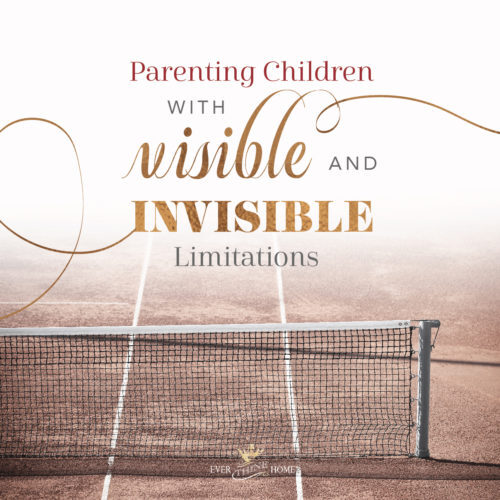
Of our two sons, one was more athletic, while the other was more scholastically inclined. The younger son’s first word was, “ball.” The older one started reading before age five. They could not be more different.
Instead of playing basketball for hours on the court Dennis built for the boys (because that’s what he did in his childhood), Samuel found a tennis racket and began hitting balls against the brick wall underneath the basket. It became clear he’d found his sport.
We enrolled him in lessons and then in competitions. By early seventh grade he was playing for the number one ranking in the state in his age division. In a tournament to determine new rankings, Samuel almost had his opponent beat, but missed one point and then on the next serve lost the match. He was disappointed, of course, but we hoped this was just the beginning. Parents dream big for their kids!
That day was indeed the beginning. But it was not the start of a dream tennis career.
A couple weeks later Samuel’s coach asked to speak to me when I picked him up after his lessons. He explained that Samuel wasn’t getting to balls he used to return with ease. “Something’s not right,” he said.
Immediately I lined up appointments for our son. The early diagnosis was unclear, so several months later we went to the Mayo Clinic, where neurologists labeled Samuel’s decreasing ability to run with the name, Charcot-Marie-Tooth, a slow deterioration of the nerves to the lower legs.
After returning home Samuel wanted to keep playing tennis and I agreed 100 percent. I designed a pair of tennis shoes with elastic support from ankle to toe to help him lift his feet so he could run and not fall as often. But six months later it was clear he would never run again.
I’ll never forget our grief and heartbreak. Dennis and I went for a walk the day the truth finally became clear to me. Five minutes into the walk I sat on a log, fell forward into a fetal position, and cried uncontrollably, with groans from a place so deep within I never knew it existed.
Learning to adjust
For the next six months or longer Dennis and I mourned. Our athletic son had lost his greatest strength. He never liked school and now it was worse. In his own grief he struggled even more in class. As our most active kid he started getting in trouble.
We knew he was mourning, but what 13-year-old knows how to process catastrophic loss? We didn’t know how to help him either. It’s impossible to prepare for something like this. So we leaned on God, prayed constantly, asked for wisdom, made mistakes, talked to those wiser and more skilled, and trusted God to use this tragedy for good in ways impossible to see in the moment.
As the months moved slowly forward we wondered how Samuel would handle high school. Would he go to college? Would he ever get married? What kind of career could he have? Would he be confined to a wheelchair one day? And most of all we wondered what God was doing and what He had planned by giving our son a real incurable life-altering physical disability.
All parents have high hopes for their children. We want life to be easy for them. We want a pain-free existence as much as is possible. We desire all these things because our children are extensions of us. “Every child is a piece of his mother’s heart walking around outside her body,” said author Jean Fleming. And it is true. Even today when my children suffer or are in pain I feel it as if it was my own.
When Samuel was diagnosed Dennis and I both longed to give him our legs. Dennis even asked if there was a transplant surgery of some kind. We would have sacrificed happily because we love our son enough to give our lives for him.
Limitations are common to all
The truth is we don’t have just one child with a limitation. Our oldest daughter is dyslexic. Our adopted daughter, though not diagnosed with a “disability,” still had her own very real obstacles through no fault of her own. Our other three have less perceptible but real limitations: bad allergies, imperfect eye-sight, teeth prone to decay, and physical limitations that prevented some of their ambitions, like becoming a volleyball star or a musician. Everyone in our family and yours is limited by relation to Adam and Eve.
My brother’s son has autism. Another nephew is on the spectrum. A dear friend’s son at 21 is living with ulcerative colitis which greatly limits his lifestyle as an otherwise healthy young man. My daughter Laura’s best friend has a son with Down Syndrome. Another friend’s daughter has three children, all diagnosed with the rare condition PANS.
Even the most intelligent among us may be geniuses or near genius but lack ordinary common sense. Like one of Dennis’s professors at Dallas Theological Seminary who had a photographic memory but forgot that he had driven his car to a speaking engagement in Houston. Afterward, he left the hotel, taxied to the airport and flew home. When he arrived he phoned his wife to come get him and she asked what he did with the car! C.S. Lewis also had a photographic memory but struggled with spelling his whole life. Go figure.
But the whole truth is that all of us are born with multiple limitations. We have no idea how much we lost in terms of intelligence, our five senses, physical and emotional abilities when Adam and Eve “fell.” All of humanity is “disabled” in some way. As I learned from my sister-in-law disabilities are really “diff-abilities” … different abilities.

The most important point of this entire post is this: None of your children or grandchildren are without disabilities. All of them have limitations, and this is good. Recognizing our own flaws and helping our children recognize theirs is an important step to acknowledging our need for a Savior.
The greatest tragedy of all is not being born with a disability or with limitations but living without knowing one’s brokenness and need for the Savior, Jesus Christ.
A single mom wrote about all that her 16-year-old son was missing since his father had died, summarizing: “Such are the children of the kingdom of God—all are missing arms or limbs, all are cracked vessels. Out of such raw material God is pleased to build His kingdom, the better to show the power is from Him.” Paul taught that we are all jars of clay, formed from dirt. All by God’s good design.
Here are six ways to embrace and give thanks for the disabilities and weaknesses God has woven into your children for their good and His glory.
Pray that your children would know they are sinners in need of Jesus.This was one of my frequent prayers for my children. I was especially concerned for my oldest and my youngest, who were both people pleasers. They didn’t rebel much or instigate sibling rivalry. I knew they could be deceived into thinking they were good on their own merit. And Satan would work to convince them of that.Our sin nature is so quick to defend our own perceived goodness and to measure ourselves against others who appear to be inferior than we. That was my own story. My three brothers were always fighting and getting into trouble. To avoid my father’s displeasure and occasional anger I was the good girl and never did anything to rock the boat.
Though I was eager to receive Christ as a college student, it was not because I felt sinful. In my own view I was not really “wicked” or “depraved” as the Bible declared. It wasn’t until my 40s that I saw the true depth of my own depravity and was convinced even more how desperately I needed Jesus’ sacrifice on the cross for my sins.
Paul declared in Romans 3:10-12 “None is righteous, no, not one; no one seeks for God. … no one does good, not even one.” Believe it and pray your children believe it too.
Give thanks for every limitation and disability you discover and teach your children to do the same.God commands us to “give thanks in all circumstances; for this is the will of God in Christ Jesus for you” (1 Thessalonians 5:18). Embrace God’s design. He knows what He’s doing and He has beautiful plans for your child’s life. Beware of constantly telling your children they can do anything and be anything they want.This may surprise you because it’s so common in our culture for parents to say this to their children. But it’s not wise or biblical parenting. The truth is your children can’t do or be anything they want. God has given them limitations on purpose to help guide them to His good and perfect plan and design which is always better than the “be and do anything they want” mentality.An important part of your job as a parent is helping your children learn how to discern God’s directions for their lives. A favorite verse of mine is Ephesians 2:10, which says, “For we are His workmanship, created in Christ Jesus for good works, which God prepared beforehand …”
Teach them to look for His design for their lives, not to find their own way. God their Maker wants to use the talents, desires, and yes, the disabilities and limitations He has given in ways that He has planned. Teach them to work with God and how He has crafted them. Remind them, “Your hands have made and fashioned me” (Psalm 119:73).And pray they will not be lured by the culture into thinking they know better than God. Sadly, too many children and adults today strive in thousands of ways to be all they imagine, many with tragic results.
Teach your children and grandchildren that no one is perfect except Jesus.It’s another trap of our present culture to strive for perfection in our looks, our image, our identity, our jobs, our families, and more. The pressure is killing people. Literally.The sooner we acknowledge we are fallen and will never find perfection on our own, the sooner we will release the pressure and turn to Jesus. “There is salvation in no one else …” Peter declared in Acts 4:12.
Remember God delights to show His power and glory.John 9 tells an amazing story. Jesus passed by a man born blind and the disciples asked whose fault it was, supposing there was a logical human explanation. But Jesus replied, “It was not that this man sinned, or his parents, but that the works of God might be displayed in him” (John 9:3). Jesus then healed this man and all who saw glorified and worshipped Him.So too in our lives God has plans and purposes that will reveal His miraculous power and care for us that we might glorify and worship Him.
Through our own children and from watching others with disabilities, I’ve learned that the pains and losses from these “gifts” that we would change or wish away are the very things God wants to use to purify, strengthen, and mold our kids into His image.

I pray this will encourage all you moms and dads who like we did want so much for your kids. It’s good that you do but keep your expectations always in surrender to God’s greater plan.
And I hope you will pass this on to someone you know who is discouraged because their child isn’t the star player or pupil but instead has been given more ordinary abilities and plenty of limitations. Or maybe you know someone has has a child who has been given a diagnosis.
God knows what He’s doing. He never makes mistakes.
The next session of Cultivating Hope in Times of Hardship and Disappointment drops tomorrow. If you haven’t yet watched session one you can watch it here. If you enjoyed session one you can watch the remaining four by clicking here to subscribe to Barbara’s Friends & Family content created especially for paid subscribers. This bible study is just the first of other new content we have planned for this year.
The post Parenting Children With Visible and Invisible Limitations appeared first on Ever Thine Home.
Barbara Rainey's Blog
- Barbara Rainey's profile
- 24 followers
















